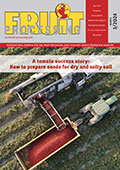State-of-the-Art Ohio (U.S.) facility helps processors accelerate product rollout
Following its recent re-entry into the high pressure processing (HPP) market, Quintus Technologies is opening a state-of- the-art Application Center in Columbus, OH (U.S.). Under the leadership of Ngoc Phan, globally recognized as one of the world’s most experienced HPP application experts, the Center will assist food and beverage processors with the development of the preservative-free, ‘good-for-you’ products demanded by today’s consumers.
“Despite thousands of commercial HPP products currently available around the globe, one source of continued frustration to more food companies is the time involved in the realization of their new HPP products market rollouts,” observes Ed Williams, General Manager – Americas, Quintus Technologies. “A key objective of our new Application Center is to reduce those delays by putting our internal and external HPP expertise to work.”
The Center’s menu of services spans the entire HPP development process, from optimized product formulations and packaging to in-house pathogen validation, shelf-life studies, and assistance with HACCP implementation and regulatory compliance. In both scope and pace, evaluation and support offerings are geared to accelerate the speed at which processors bring new HPP products to market.
The new Application Center, part of a 5,200-sf demonstration suite, features a commercial size Quintus QIF 150L HPP modular system. Reflecting the company’s leadership role in high pressure for nearly three-quarters of a century, the press incorporates new mechanical and digital solutions such as an integrated pumping system, frequency-controlled motor drives, new smart-press functionality, and AI algorithm-based condition monitoring, all advances that improve efficiency and productivity.
The facility is also equipped with a test kitchen, microbiology laboratory, analytical laboratory, vacuum packaging machine, walk-in cooler, and freezer.
Application Center services are available to any food or beverage company wanting to advance the commercial growth of HPP foods. Processors interested in investing directly in a Quintus Technologies food system receive additional benefits through Quintus® Care, a comprehensive program of application know-how and best-in-class aftermarket technical support, designed for industry 4.0 and factory-of-the-future connectivity.
“We are very excited about the opportunities to help the food industry address global sustainability challenges such as food waste, product recalls, and related foodborne illnesses through the HPP technology we pioneered,” says Jan Söderström, CEO and President of Quintus Technologies. “We look forward to welcoming processors to our Application Center open house planned for late April 2022.”









